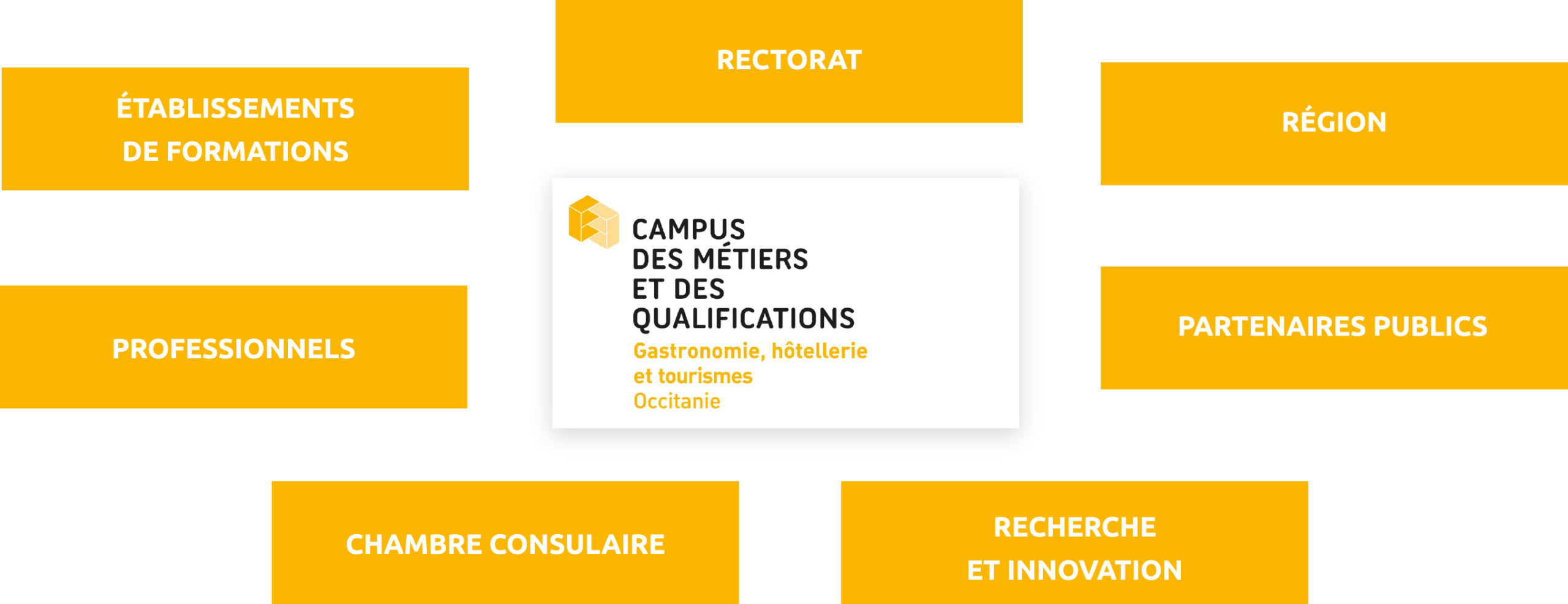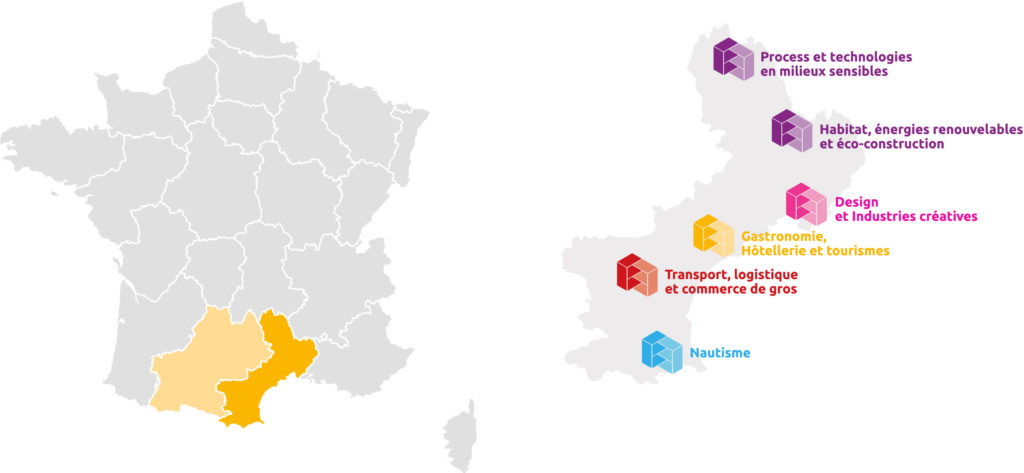
A network of actors
involved in the development of competences and qualifications
The Campus des Métiers et des Qualifications GASTRONOMIE, HÔTELLERIE et TOURISMES Occitanie is co-sponsored by the Montpellier Academy and the Occitanie Region, it was labeled in 2015.
The perimeter of the Campus extends over a dynamic territory in terms of tourism consumption. In this record-breaking region in terms of population growth, tourism innovation and business creation, the Campus presents a major challenge in terms of supporting territorial policies, economic and social development.
MAKE THE TERRITORY ATTRACTIVE
An ecosystem of players in training, business and research
- 27 training institutions and universities,
- 2 research laboratories,
- 6 professional organizations,
- 10 companies from SMEs to multinational groups (mariott / accor / serignan plage / cabiron / roussill’hotel / toques blanches / kinoa / pop)
- Local and regional authorities
The Campus creates synergies, it contributes to the pooling of practices, to raising the level of qualifications and to the adaptation of the offer of training in line with developments in the profession and the expectations of socio-professionals. They are all linked by common challenges.

SHARED GOVERNANCE
- a Regional Strategic Orientation Committee (CROS) co-chaired by the Rector of the Academic Region Occitanie, Rector of the Academy of Montpellier and the President of the Regional Council Occitanie.
- a Strategic Orientation Committee (COS) sets the main orientations in terms of activities and budget. The frequency of meetings is from 1 to 2 per year.
- a Plenary Committee brings together all the members and partners of the Campus, it meets once a year. The annual report of actions and strategic orientations are presented there.
- a Management Board brings together the founding members, managed by the Director, it is the pivot between the strategic and operational levels.
The frequency of meetings is from of 6 to 10 per year. The Management Board is composed of :- 1 higher education institution (University),
- 2 representatives of the professionals,
- 1 Campus Director (Head of the support high school),
- 1 Representative of the Rector (DAFPIC).
COMITÉ RÉGIONAL D’ORIENTATION STRATÉGIQUE
Fixe les axes stratégiques des CMQ
Valide les axes d’élargissement et d’approfondissement des campus
Accompagne l’analyse des auto-évaluation
Consulté pour la validation tout projet de labellisation ou de relabellisation
COMITÉ D’ORIENTATION STRATÉGIQUE
Définit les orientations
Adopte programme annuel et budget prévisionnel
Se prononce sur admission ou retrait des membres
DIRECTOIRE
Propose au C.O.S les orientations et les projets à mettre en oeuvre
Précise les conditions d’animation, de suivi et d’évaluation des activités
Prépare programme annuel et budget prévisionnel
COMMISSIONS TECHNIQUES
Mise en place à l’issue des C.O.S
Nombre et composition varient selon les thèmes retenus.
COMITÉ PLÉNIER
Ensemble des acteurs
Bilan annuel des actions
Présentation des orientations stratégiques
AN INTER-CAMPUS ACADEMIC NETWORK IN THE TERRITORY
IN THE TERRITORY
The current perimeter (5 departments of the former Languedoc Roussillon region; Montpellier academy) lists 6 campuses with different themes:
HEREC = Housing, renewable energies and eco-construction
TLCG = Transport Logistics and Wholesale Trade
DIC = Design and Creative Industries
NC = Nautism
Communication strategies, partnership development, strategic axes and some actions are developed in
inter-campus.

A NATIONAL INTER-CAMPUS NATIONAL NETWORK OF THE THEMATICS – Tourism; Hotels; Catering
They constitute a network linked by an annual national seminar on the theme during from which mutualisable actions are offered.
The GHT campus exchanges in particular with the Hauts de France campus, the PACA campus, the Rhônes-Alpes campus and the Guadeloupe campus.
STRONG STRATEGIC AXES
RESULTING FROM A SHARED DIAGNOSIS
BUILDING ADAPTED TRAINING COURSES
How? Legibility and coherence of the initial, apprenticeship and continuing training offer from CAP to MASTER; fluidity and security of the courses.
SUPPORTING LIFELONG LEARNING
How? Diversity of the training offer for different audiences and adaptation of training methods to the expectation and skill needs of companies.
FEDERATING THE PLAYERS TO PROMOTE EMPLOYABILITY
How? Pooling of internship offers and partnerships. Development of mobility and international projects.
INNOVATING – SHARING PRACTICES
Academic and scientific research related to the professional environment. A space for meeting and exchange, the campus is a catalyst for collaborative and collective projects.
TRAINING at all levels and all statuses
in training courses of the future
- Tourism – Tourism Management
- Hotels – Management in HR
- Tableware – Lodging
- Cooking – Catering
- Gastronomy – Sommellerie – Bar
- Chocolatier confectioner
- Cream cheese maker
- Bakery – Pastry
THE + OF THE CAMPUS
Connected to a network of players made up of companies, institutions and training establishments ranging from pre-baccalaureate to bac+5, the Campus is built as a response to the rapid technological changes in the hotel and catering and tourism professions as well as to the growing needs of this dynamic sector for qualified manpower.
Formation sous STATUT SCOLAIRE
Formation en APPRENTISSAGE
Formation CONTINUE